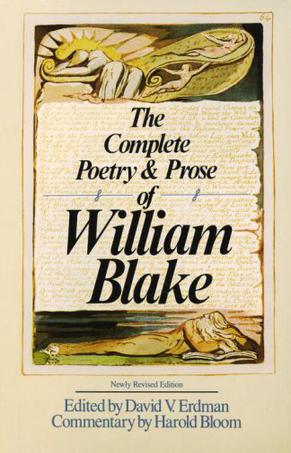William Blake
William Blake
From Publishers Weekly
Editions of Blake's poetry which as an artist and printer he frequently engraved and published himself most often fail to reproduce his integral illustrations, or do so in poor enough quality as to negate the effort. This Complete edition from the Blake Trust, published last year in a Thames and Hudson hardback edition that is now out of print, should replace the b&w-only Dover edition (but not David V. Erdman's commentary therein, or his reading text The Complete Poetry and Prose of William Blake) for any reader. The 366 crisp color and 30 b&w reproductions here, culled from the scholarly Princeton University Press six-volume annotated set, are little short of a revelation, giving us Songs of Innocence, Songs of Experience, America, Milton, Jerusalem and the rest of the Blake canon in a form acceptably close, as Binder's introduction makes clear, to the way Blake wanted us to see them. Many of these works are currently hanging in a special Blake exhibition the largest ever at the Met in New York, for which the Abrams book serves as an informative and revealing catalogue. Hamlyn, a senior curator at London's Tate (where the exhibition originated), and the University of York's Phillips present prints, drawings, paintings, selections from Blake's own illuminated books and other relevant materials, such as snapshots from Blake's marvelous editions of Edward Young's Night Thoughts and Thomas Gray's Poems. Introductory essays from novelist and biographer Peter Ackroyd (Blake; T.S. Eliot) and Marilyn Butler, rector of Oxford's Exeter College, synopsize Blake's life and times, while extensive "label copy" situates each work as presented. While the visual overview is useful and some of the detail shots of larger works are compelling, poetry readers who have to choose will take the Complete.
Copyright 2001 Cahners Business Information, Inc.
Review
Blake was not just a poet; nor was he just a book publisher. He was also an artist who developed a unique method of etching in relief so that text and illustration could be mixed on the page. Each book of his poetry was unique, illustrated with his brilliantly distinctive pictures, varying slightly in colour, page order, and sometimes even text. The processes were laborious but the results magical, and in this collection of the complete texts, the reproductions do real justice to the beauty of the original pages. For any Blake fans, at last this is an affordable way to own high-quality reproductions of his beautiful illustrations, and to see his poems in the contexts he placed them. (Kirkus UK)
This book makes a strong case that if you know Blake's poems you're getting only half—or rather none of—the picture. -- The New York Times, Christopher Benfey, 3 December 2000 --This text refers to an out of print or unavailable edition of this title.
Product Description
In his Illuminated Books, William Blake combined text and imagery on a single page in a way that had not been done since the Middle Ages. For Blake, religion and politics, intellect and emotion, mind and body were both unified and in conflict with each other: his work is expressive of his personal mythology, and his methods of conveying it were integral to its meaning. There is no comparison with reading books such as Jerusalem, America, and Songs of Innocence and of Experience in Blake's own medium, infused with his sublime and exhilarating colors. Tiny figures and forms dance among the lines of the text, flames appear to burn up the page, and dense passages of Biblical-sounding text are brought to a jarring halt by startling images of death, destruction, and liberation. Blake's hope that his books would obtain wide circulation was unfulfilled: some exist only in unique copies and none was printed in more than very small numbers. Now, for the first time, the plates from the William Blake Trust's Collected Edition have been brought together in a single volume, with transcripts of the texts and an introduction by the noted scholar David Bindman. A major retrospective exhibition of Blake's work can be seen at the Metropolitan Museum of Art (March-June 2001). 400 color illustrations.
Includes:
Jerusalem
Songs of Innocence and of Experience
All Religions are One
There is No Natural Religion
The Book of Thel
The Marriage of Heaven and Hell
Visions of the Daughters of Albion
America a Prophecy
Europe a Prophecy
The Song of Los
Milton a Poem
The Ghost of Abel
On Homers Poetry [and] On Virgil
Laocoon
The First Book of Urizen
The Book of Ahania
The Book of Los

